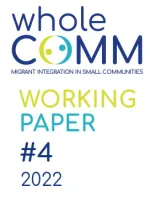Post-2014 migrants’ access to housing, employment and other crucial resources in small- and medium-sized towns and rural areas in Spain

Working Paper No. 4 - Spain
This report looks at post-2014 migrants’ access to housing, employment, and other relevant resources in different small and medium-sized towns and rural areas in Spain. Primarily based on interviews conducted in six selected municipalities, it provides an overview of 1) the concrete barriers that post-2014 migrants are facing in relation to housing and employment; 2) the local actors who are involved in, and/or seen as responsible for, facilitating their access; 3) any concrete local measures or practices that help or hinder this access; and 4) the specific target groups of these measures, initiatives or practices. The findings suggest that across the rather diverse range of localities (located in four different regions), housing and employment are perceived as the most significant challenges that post-2014 migrants are facing. Their difficulty to find and secure adequate housing primarily reflects local dynamics of (limited) supply and (increasing) demand but also a significant degree of discrimination based on their ethnicity and/or precarious legal status. Irregularity is also frequently mentioned as the main barrier in terms of employment, and as a problem that cannot be solved at the local level. The employment situation of post-2014 migrants also reflects the general economic and labour market situation in each locality, whereby they usually fill very specific and often seasonal demands for (mostly low-paid and precarious) labour. In both spheres, the role of local administrations is rather limited, whereas private actors (local employers, property owners, real estate agents, etc.) and third sector organisations (especially NGOs and migrant associations) are attributed a very crucial role.